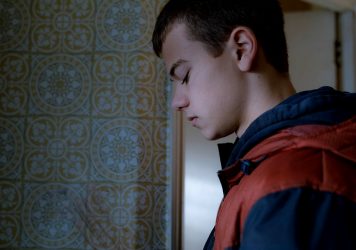Leonie Krippendorf’s queer teen romance is a sun-kissed story of growth and metamorphosis.
Set during a Berlin summer (an extremely hot one), Leonie Krippendorf’s debut feature, Cocoon, follows 14-year-old Nora (Lena Urzendowsky), whose sheepishness and reluctance to step forward into adulthood are embraced by the all-encompassing glow of the film’s warm cinematography.
Nora tags along in the shadow of her outspoken, flirtatious, 16-year-old sister, Jule (Lena Klenke), along with Jule’s best friend, Aylin (Elina Vildanova), as they spend their time basking in the sun by the local pool, smoking weed and ogling teenage boys from the neighbourhood.
It is abundantly clear that Nora does not feel comfortable in this world, nor is she truly accepted there, and so it is no surprise that she breaks away to seek solace in the company of Romy (Jella Haase), an audacious indie girl in her sister’s class with short, ragged blond hair, an androgynous DIY style and a tenacity to be friends with the boys most desired by Nora’s sister.
The film’s title indicates the metaphor of a caterpillar’s life cycle. Natural, if not overdone, is the association between a coming-of-age film (a queer one at that) and a butterfly’s metamorphosis. Krippendorf emphasises this association by featuring a colony of caterpillars that Nora keeps beside her bed, and she swings back to capture the eventual flutterings of butterflies as the film progresses.

The coordination of the plot and the visuals depicts a passionate commitment to the film’s female coming-of-age story: as Nora’s confidence and joy wax and wane with the unfolding love story, the aspect ratio shifts from 4:3 to 16:9 – the screen dilates as would one’s pupils when falling in love. From that moment, with its vignettes of queer teenage ecstasy delivered through Nora and Romy’s first Pride parade, rainbow flags waving through strong rays of sunlight, Nora takes flight. She embraces her journey instead of taking the passenger’s seat.
Moments of young, teenage-girl desire are lingered on, including female masturbation which is rendered through the eyes of the protagonist. Most prominent is the portrayal of menstruation on screen, with Nora’s discomfort and shame taking centre stage rather than leading her to become the subject of humiliation from her classmates – this is by no means a riff on Brian De Palma’s Carrie.
The moments that follow, instead, are ones that evoke an untethered empathy, with Romy immediately coming to Nora’s aid. The scene encompasses kindness, friendship and an obvious mutual understanding between the two girls that initiates a relationship. Furthermore, there is no heinousness or outright disdain surrounding homosexuality in the film, echoed by the acceptance that Nora is met with after she comes out for the first time unprompted to a boy who tries to make a pass at her at a party. There are no hateful looks or cruel words, just a relaxed smile and the utterance of, “I think it’s cool.”
While heartbreak is imminent as it is a coming-of-age film, the absence of hopelessness brings a lightness to the film not begotten by hollowness, and you may even find yourself with a melancholy smile, as Nora’s metamorphosis is complete: she breaks out of her cocoon.
Published 8 Dec 2020
Overdone, yet charming coming- of-age film within the domain of lesbian cinema.
Emotionally and aesthetically stunning scenes with a uniquely feminist and queer narrative.
New and radical moments will linger in your thoughts for days to come.

By Anton Bitel
A Cornish caravan park provides the backdrop to a young woman’s sexual (re)awakening in Claire Oakley’s impressive debut.

By Katie Goh
Céline Sciamma’s sumptuous, quietly radical 18th century love story is one of the year’s very best.

Henry Blake’s assured debut sees a young boy forced into trafficking drugs across the UK’s internal borders.